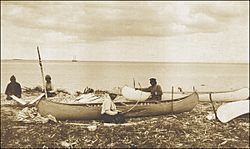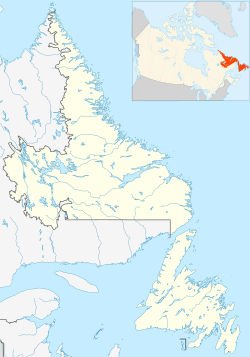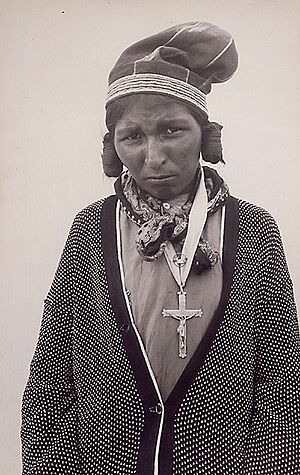Sheshatshiu facts for kids
Quick facts for kids
Sheshatshiu
Tshishe-shatshu
|
|
|---|---|
| Sheshatshiu Indian Reserve No. 3 | |

Innu near Sheshatshiu in the 1920s.
|
|
| Country | |
| Province | |
| Settled | 1960s (as a permanent settlement), 19th Century (as a trading post) |
| Recognition under the Indian Act | 2002 |
| Population
(2021)
|
|
| • Total | 1,225 |
| Time zone | UTC-4 (AST) |
| Area code(s) | 709 |
| Highways | |
| Website | http://sheshatshiu.ca/ |
Sheshatshiu (pronounced sheh-hat-chew) is a special community for the Innu people in Newfoundland and Labrador, Canada. It is a federal reserve and a designated place. The community is about 40 kilometers north of Happy Valley-Goose Bay. The name Sheshatshiu means "a narrow place in the river" in the Innu-aimun language.
The people living here are part of the Sheshatshiu Innu First Nation. Their current leader is Chief Eugene Hart.
Contents
History of Sheshatshiu
Early Trading and Settlement
In 1836, the Hudson's Bay Company set up a trading post nearby at North West River. This allowed the Innu people to trade their furs for European tools and goods.
For a long time, Sheshatshiu was a place the Innu used for trading and as a seasonal camp near the coast. It wasn't until the 1960s that the Innu of Labrador began to settle into permanent villages. This made them one of the last Indigenous groups in Canada to do so.
Health Care and Elections
In 1915, the International Grenfell Association opened a hospital in North West River. This hospital helped both European settlers and Indigenous people in the area. However, it closed in 1983. Today, people in Sheshatshiu get their medical care from Happy Valley-Goose Bay.
In 1946, elections were held for the Newfoundland National Convention. This was the first time people in Labrador could vote. Lester Burry, who supported Newfoundland joining Canada, was elected.
Joining Canada and Protecting Rights
When Newfoundland and Labrador joined Canada in 1949, the Indian Act did not include the First Nations of the province. This meant they could still vote, but it also made it harder for the Innu to protect their land and culture.
In 2002, the Innu of Labrador officially became "status Indians" under the Indian Act. This gave them more rights and protections. In 2006, Sheshatshiu 3 became a federal reserve, which means the land is set aside for the Innu people.
Community Protests
In the 1980s and 1990s, the community of Sheshatshiu, along with the Innu Nation, protested. They were against NATO's low-level military training flights that used CFB Goose Bay. These flights were very noisy and affected their traditional way of life.
In 1997, Queen Elizabeth II visited Sheshatshiu. Community leaders gave her a letter. It talked about the challenges brought by European settlement and the Innu's desire to protect their culture and land.
Geography
Sheshatshiu is located in Labrador, within Division No. 10. It is right next to North West River, which is an Inuit community.
Sheshatshiu is connected to Happy Valley-Goose Bay by a paved road that is about 40 kilometers long. The roads in Sheshatshiu and North West River are the most northern paved roads in Atlantic Canada. The community is also located close to the geographic center of the province.
Demographics
Population and Language
In the 2021 Census, the Sheshatshiu 3 reserve had a population of 1,225 people. These people lived in 340 homes. The population changed from 1,500 people in 2016.
The reserve covers an area of about 8.48 square kilometers. This means there were about 144.5 people living in each square kilometer in 2021. The average age of people in Sheshatshiu is 27 years old.
Most of the people in Sheshatshiu, about 99.2%, are Indigenous. There are also some people of European background. The main religion in the community is Catholicism. Most residents speak a dialect of the Cree language, which is part of the Innu language family. English is also commonly spoken in Sheshatshiu.
Notable People
- David Penashue, a rock singer.
- Peter Penashue, who was a government minister under Prime Minister Stephen Harper from 2011 to 2013.
 | George Robert Carruthers |
 | Patricia Bath |
 | Jan Ernst Matzeliger |
 | Alexander Miles |



